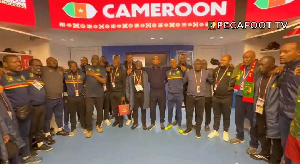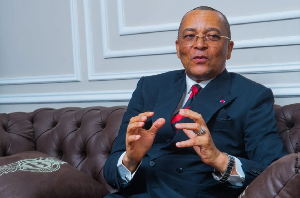Scores of men, women and children were killed in the Nigerian towns of Baga and Doron Baga on 3 January when Boko Haram militants launched a fierce attack. The exact number of dead remains unknown, but claims vary from 150 up to 2,000 people killed. The BBC met survivors at refugee camps in Chad in order to piece together a picture of what happened that day.
"We went to the military barracks to ask the soldiers what was happening. They told us that Boko Haram may be attacking, so we took our machetes and knives to defend ourselves" Harun Muhamad, survivor from Baga said.
Many inhabitants had already gone to pray when gunshots rang out on Saturday, 3 January. The first raid started at about 05:45 local time (04:45 GMT), just before dawn.
As Boko Haram fighters rushed through the west side of Baga, a group of determined young men collected their "cutlasses" - or machetes - and knives to defend their town. It was a rare success.
"We pushed them back, together with our soldiers," said local man Harun Muhamad, 31.
The Islamist militants were forced to retreat into the bush.
"We all came out in masse to fight back," recalled 20-year-old Dahiru Abdullahi, adding that most fighters were wearing army uniforms of different kinds.
"Some also had black coats on and turbans," he said. Such headwear is common in this desert area, where insurgents often use them to cover their faces.
After the militants' retreat, there was a lull in the fighting and some relief in the town, but it did not last long.
A few hours later, Boko Haram combatants stormed the town again. Their ranks had swollen to a terrifying column of pick-up trucks and motorcycles.
"They came back out from the bush with around 20 vehicles," said Dahiru Abdullahi.
Between 10 and 15 armed men jumped from each car. It remains impossible to know how many fighters took part in the assault, refugees spoke of "hundreds". The local men were also out-gunned.
"They opened fire, they kept shooting at us," said Dahiru Abdullahi. "Because we were trying to defend ourselves with machetes, we had to leave."
Harun Muhamad also said the second wave of Boko Haram militants was "too many", forcing everyone to run for their lives.
The survivors described how the armed intruders yelled at the young men who had earlier brandished locally made weapons.
"Be brave, men, why don't you fight us?" they shouted.
Faced with the advancing militants, the Nigerian soldiers, too, gave up fighting and fled. Witnesses say many threw or dropped their weapons on the ground as they went, leaving them for others to retrieve.
"Vigilantes picked up these weapons and fired back, but they found themselves overwhelmed by the force against them and [they] ran as well," said Saratu Garba, 20, mother of a two-year-old boy.
As the armed group progressed through the town, witnesses described it as a pandemonium. People fled in all directions; many thinking that they could seek refuge in the nearby fishing town of Doron Baga, on the shore of Lake Chad.
"When I was running and they were hunting us, shooting us, some people were falling and dying, others being run over with motorbikes and dying. Some reached the bank of the lake" said Hadija Abakar, survivor from Baga.
Opinions of Thursday, 5 February 2015
Auteur: Thomas Fessy- BBC













